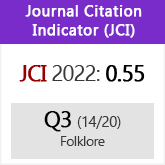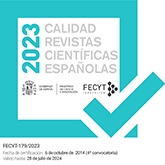“The Stimulants of the Spirit”: On The Regeneration and Revitalization of Nations
DOI:
https://doi.org/10.3989/rdtp.2010.001Keywords:
Revitalization, Regeneration, Categories of Understanding, Organic Metaphor, Theory of Degeneration, Theory of Generations, Aporia of Time, HomeostasisAbstract
Moving along in one’s course of life requires a certain will to socially participate with others in common projects; at least in those that lead to a better future. Yet the will is not a constant and often the spirit fails and the course is lost. The “wealth of nations” —as Adam Smith put it— is supposed to result from the fruition and success of those national projects, thence the logical inference that such projects depend upon the spirit and will of those citizens who participate in them. In the process, issues of proactive identity may become matters of concern and, in response, people as well as their society as a whole attempt “to revitalize” themselves. “Revitalization,” which is a concept of long term use in American anthropology, applies chiefly to the study of colonized societies and cultures; but it calls to mind the secular concern in Spain for the “regeneration” of the nation and the subsequent literature of regeneracionismo. The meaning of both concepts —“revitalization” and “regeneration”—, as well as the movements associated with one or the other, are closely contingent upon the political, social and personal context to which these movements belong.
Downloads
References
Anderson, B. 1983. Imagined Communities: Reflections on the Origin and Spread of Nationalism. Londres: Verso.
Aronna, M. 1999. “Pueblos Enfermos”: The Discourse of Illness in the Turn-of- the-Century Spanish and Latin American Essay. Chapel Hill: University of North Carolina Press.
Calaf Masachs, R. y O. Fontal Merilla (eds.). 2004. Comunicación educativa del patrimonio. Gijón: Trea.
Caro Baroja, J. 1949. Análisis de la cultura: etnología-historia-folklore. Madrid: Rubiralta.
Costa Martínez, J. 1897. Reforma de la fé pública. Madrid: Hijos de Reus.
Costa Martínez, J. 1898. El problema de la ignorancia del Derecho y sus relaciones con el status individual, el referéndum y la costumbre. Barcelona: Manuel Soler.
Elliott, J. 1977. “Self-Perception and Decline in Early 17th-century Spain”. Past & Present 74: 41-61. doi:10.1093/past/74.1.41
Fernandez McClintock, J. W. 1988. “El dominio del tropo. Poesía popular y convivencia social: Gracián y Costa en el campo”. Anales de la Fundación Joaquín Costa 5: 21-35.
Fernandez McClintock, J. W. 2004. “El celtismo astur-gallego: Una tradición nueva y vieja”, en C. Ortiz García (ed.), La Ciudad es para ti: Nuevas y viejas tradiciones en ámbitos urbanos: 37-53. Barcelona: Anthropos.
Fernandez McClintock, J. W. y R. González-Quevedo. En prensa. “A Language Manifesto and the Politics of Language Identity: Ancestors and Descendents”, en The Struggle for Normalization of the Asturian Language (Spain).
Fernandez, J. W. y R. L. Fernandez. 2009. “Práticas Patrimoniais: Contextos Semanticos”, en A. Medeiros y M. J. Ramos (coords.), Memoria e Artificio: A Materia do Patrimonio II: 19-40. Lisboa: Sociedade de Geografia de Lisboa.
Gore, A. 2007. The Assault on Reason. Nueva York: Penguin.
Harkin, M. E. (ed.). 2004. Reassessing Revitalization Movements: Perspectives from North America and the Pacific Islands. Lincoln: University of Nebraska Press.
Harrison, J. 2000. “Introduction: The Historical Background to the Crisis of 1898”, en J.
Harrison y A. Hoyle (eds.), Spain’s 1898 Crisis: Regenerationism, Modernism, Postcolonialism: 1-8. Manchester: Manchester University Press.
Hoyle, A. 2000. “Introduction: The Intellectual Debate”, en J. Harrison y A. Hoyle (eds.), Spain’s 1898 Crisis: Regenerationism, Modernism, Post-colonialism: 9-51. Manchester: Manchester University Press.
Lisón Tolosana, C. 1983. Belmonte de los Caballeros: Anthropology and History in an Aragonese Community. Princeton: Princeton University Press.
Maeztu, R. de. 1899. Hacia otra España. Bilbao: Cardenal.
Maeztu. R. de. 1938 [1934]. Defensa de la Hispanidad. Valladolid: Aldus.
Marías, J. 1961. El método histórico de las generaciones. Madrid: Revista de Occidente.
Menéndez Pidal, R. 1944. La unidad del idioma. Discurso de inauguración. Madrid: Instituto Nacional del Libro Español.
Minter, G. 2000. “Amor y Pedagogía, An Object Lesson in Biography”, en J. Harrison y A. Hoyle (eds.), Spain’s 1898 Crisis: Regenerationism, Modernism, Post-colonialism: 81-90. Manchester: Manchester University Press.
Nisbet, R. A. 1969. Social Change and History: Aspects of the Western Theory of Development. Nueva York: Oxford University Press.
Pike, F. B. 1981. “The Psychology of Regeneration: Spain and America at the Turn of the Century”. The Review of Politics 43 (2): 218-241. doi:10.1017/S0034670500029739
Ramón y Cajal, S. 1913-1914. Estudios sobre la degeneración y regeneración del sistema nervioso. 2 Vols. Madrid: Hijos de Nicolás Moya.
Ramón y Cajal, S. 1951. Precepts and Counsels on Scientific Investigation: Stimulants of the Spirit. Traducción de J. Mª Sánchez Pérez. Edición y notas de C. Courville. Mountain View: Pacific Press.
Ramón y Cajal, S. 1971 [1895]. Los tónicos de la voluntad: Reglas y consejos sobre investigación científica. Madrid: Espasa Calpe.
Rodgers, E. 2005. “Galdós, Europe and the Regeneration of Spain”. Bulletin of Spanish Studies LXXXII (3-4): 465-484. doi:10.1080/1475382052000342770
Rodríguez Campos, X. Ms. “El turismo y la reflexividad de la cultura en Galicia”, inédito.
Round, N. G. 2000. “Horrible Children”, en J. Harrison y A. Hoyle (eds.), Spain’s 1898 Crisis: Regenerationism, Modernism, Post-colonialism: 91-103. Manchester: Manchester University Press.
Tejón Hevia, M. N. 2004. “La Tonada Allerana como exponente significativo del patrimonio intangible”, en R. Calaf Masachs y O. Fontal Merilla (eds.), Comunicación educativa del patrimonio: 221-248. Gijón: Trea.
Wallace, Anthony, F. C. 1956. “Revitalization Movements”. American Anthropologist 58 (2): 264-281. doi:10.1525/aa.1956.58.2.02a00040
Wallace, Anthony F. C. 1965. “Driving to work”, en M. Spiro (ed.), Context and Meaning in Cultural Anthropology: 277-292. Glencoe, Il.: The Free Press.
Weber, E. 1976. Peasants into Frenchmen: The Modernization of Rural France. Stanford: Stanford University Press.
Wigod, J. D. 1952. “Negative Capability and Wise Passiveness”. PMLA 67 (4): 383-390.
Downloads
Published
How to Cite
Issue
Section
License
Copyright (c) 2010 Consejo Superior de Investigaciones Científicas (CSIC)

This work is licensed under a Creative Commons Attribution 4.0 International License.
© CSIC. Manuscripts published in both the printed and online versions of this Journal are the property of Consejo Superior de Investigaciones Científicas, and quoting this source is a requirement for any partial or full reproduction.All contents of this electronic edition, except where otherwise noted, are distributed under a “Creative Commons Attribution 4.0 International” (CC BY 4.0) License. You may read here the basic information and the legal text of the license. The indication of the CC BY 4.0 License must be expressly stated in this way when necessary.
Self-archiving in repositories, personal webpages or similar, of any version other than the published by the Editor, is not allowed.















